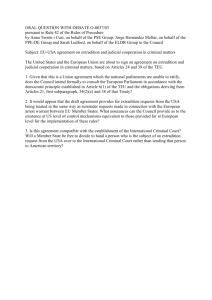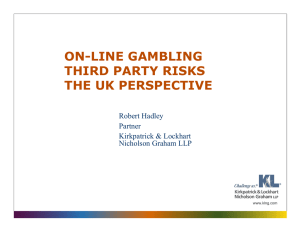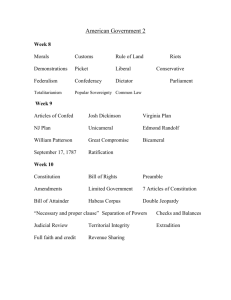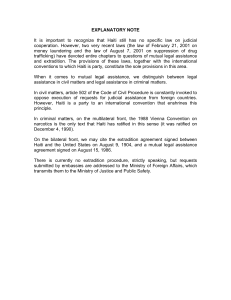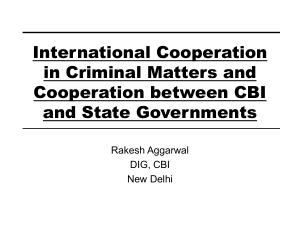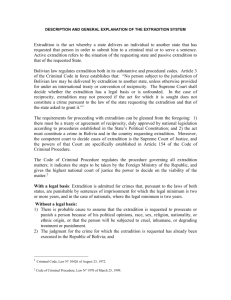Alert K&LNG Betting & Gaming U.K. Executives at Risk for Extradition
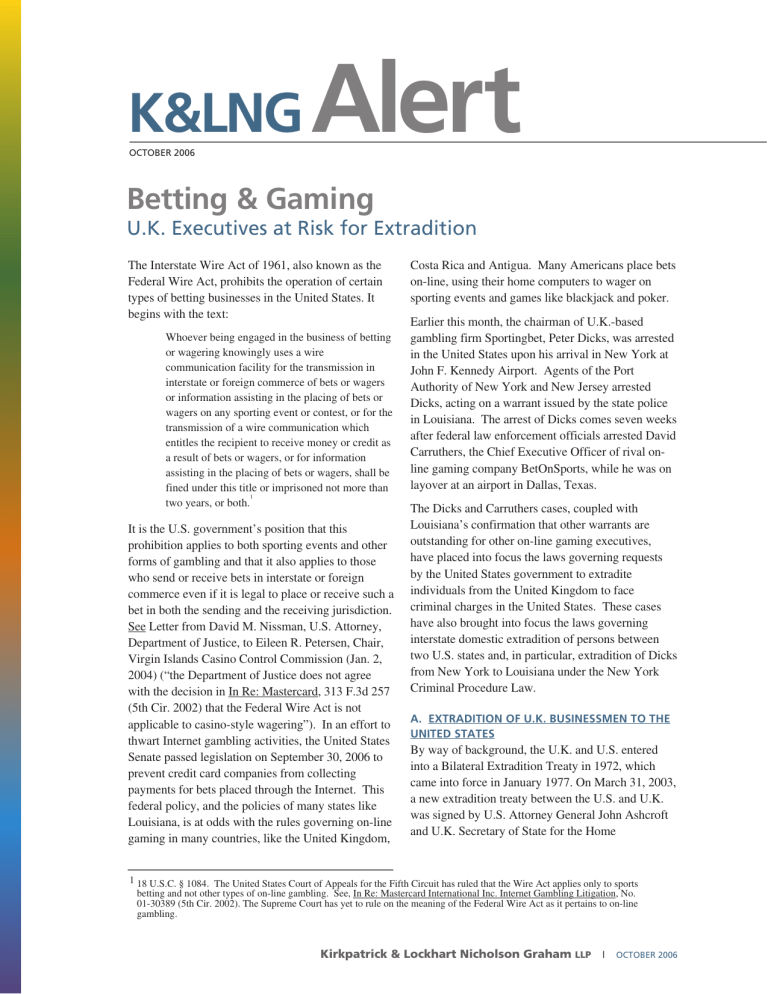
K&LNG
OCTOBER 2006
Alert
Betting & Gaming
U.K. Executives at Risk for Extradition
The Interstate Wire Act of 1961, also known as the
Federal Wire Act, prohibits the operation of certain types of betting businesses in the United States. It begins with the text:
Whoever being engaged in the business of betting or wagering knowingly uses a wire communication facility for the transmission in interstate or foreign commerce of bets or wagers or information assisting in the placing of bets or wagers on any sporting event or contest, or for the transmission of a wire communication which entitles the recipient to receive money or credit as a result of bets or wagers, or for information assisting in the placing of bets or wagers, shall be fined under this title or imprisoned not more than two years, or both.
1
It is the U.S. government’s position that this prohibition applies to both sporting events and other forms of gambling and that it also applies to those who send or receive bets in interstate or foreign commerce even if it is legal to place or receive such a bet in both the sending and the receiving jurisdiction.
See Letter from David M. Nissman, U.S. Attorney,
Department of Justice, to Eileen R. Petersen, Chair,
Virgin Islands Casino Control Commission (Jan. 2,
2004) (“the Department of Justice does not agree with the decision in In Re: Mastercard, 313 F.3d 257
(5th Cir. 2002) that the Federal Wire Act is not applicable to casino-style wagering”). In an effort to thwart Internet gambling activities, the United States
Senate passed legislation on September 30, 2006 to prevent credit card companies from collecting payments for bets placed through the Internet. This federal policy, and the policies of many states like
Louisiana, is at odds with the rules governing on-line gaming in many countries, like the United Kingdom,
Costa Rica and Antigua. Many Americans place bets on-line, using their home computers to wager on sporting events and games like blackjack and poker.
Earlier this month, the chairman of U.K.-based gambling firm Sportingbet, Peter Dicks, was arrested in the United States upon his arrival in New York at
John F. Kennedy Airport. Agents of the Port
Authority of New York and New Jersey arrested
Dicks, acting on a warrant issued by the state police in Louisiana. The arrest of Dicks comes seven weeks after federal law enforcement officials arrested David
Carruthers, the Chief Executive Officer of rival online gaming company BetOnSports, while he was on layover at an airport in Dallas, Texas.
The Dicks and Carruthers cases, coupled with
Louisiana’s confirmation that other warrants are outstanding for other on-line gaming executives, have placed into focus the laws governing requests by the United States government to extradite individuals from the United Kingdom to face criminal charges in the United States. These cases have also brought into focus the laws governing interstate domestic extradition of persons between two U.S. states and, in particular, extradition of Dicks from New York to Louisiana under the New York
Criminal Procedure Law.
A. EXTRADITION OF U.K. BUSINESSMEN TO THE
UNITED STATES
By way of background, the U.K. and U.S. entered into a Bilateral Extradition Treaty in 1972, which came into force in January 1977. On March 31, 2003, a new extradition treaty between the U.S. and U.K.
was signed by U.S. Attorney General John Ashcroft and U.K. Secretary of State for the Home
1 18 U.S.C. § 1084. The United States Court of Appeals for the Fifth Circuit has ruled that the Wire Act applies only to sports betting and not other types of on-line gambling. See, In Re: Mastercard International Inc. Internet Gambling Litigation, No.
01-30389 (5th Cir. 2002). The Supreme Court has yet to rule on the meaning of the Federal Wire Act as it pertains to on-line gambling.
Kirkpatrick & Lockhart Nicholson Graham LLP | OCTOBER 2006
Department, David Blunkett. The provisions of the
Treaty were implemented by the U.K. through legislation known as the Extradition Act 2003. It was not until September 30, 2006 that the U.S. Senate unanimously ratified the U.S.-U.K. Extradition
Treaty.
Following receipt of a valid extradition request from the U.S., the U.K. Secretary of State must issue a certificate and, along with the request, forward them to the appropriate court. If the court has reasonable grounds for believing that the offense cited in the request is an “extradition offense” (as will be elaborated upon more fully below) and that there is information that would justify the issuance of a warrant for the arrest within the court’s own jurisdiction to the U.K., then an arrest warrant may be issued. The individual is brought to the relevant
U.K. court and a date for the extradition hearing is set. At the extradition hearing, the court, provided that it decides that the person before it is the person whose extradition is sought, must consider the following:
1. Whether the offense is an extradition offense (an extradition offense is conduct which amounts to a crime punishable by a potential prison sentence of at least 12 months in both the U.K. and the U.S.
);
2
2. Whether extradition is barred for any of the following reasons: a. there has been a previous acquittal or conviction for the same offense, i.e., the rule against double jeopardy; b. it appears that the individual is being prosecuted, or will be prejudiced, due to his race, religion, nationality, gender, sexual orientation or political opinions; c. extradition would be unjust or oppressive due to the passage of time; or d. there are relevant hostage-taking considerations;
3. Whether the person should not be extradited because extradition would be incompatible with the individual rights set forth in the U.K. Human
Rights Act 1998 – principally in this context the right to a fair trial; and
4. Whether extradition is barred because it would be unjust or oppressive due to the individual’s physical or mental state.
If the U.K. court concludes that the offense is an extradition offense and is not barred by any of the foregoing factors, the U.K. court must send the request back to the U.K. Secretary of State for a decision on whether to make an order for extradition.
The Secretary of State must order extradition unless:
(1) the individual could face the death penalty once extradited and no adequate written assurance has been received from the U.S. that the death penalty will not be imposed; (2) there is no specialty arrangement that prevents the individual from being prosecuted for an offense other than the one for which extradition is sought; or (3) the subject was extradited to the U.K. from another country.
The individual may appeal to the High Court the
U.K. Secretary of State’s order of extradition and/or the U.K. lower court’s decision to send the case to the Secretary of State. The U.S. may also appeal discharge of the individual by the U.K. court and/or
U.K. Secretary of State.
A further appeal may be made from the High Court to the House of Lords by either the individual or the
U.S., provided that leave to appeal is granted by the
High Court or the House of Lords. Leave to appeal is only granted if the High Court has certified that there is a point of law of general public importance involved in the decision and that the point is one which should be considered by the House of Lords.
In addition, there is scope for an application to the
European Court of Human Rights. Once the appeals process has been exhausted and, if the U.S. request for extradition has been upheld, an order for extradition is made.
Ian Norris, former Chief Executive of Morgan
Crucible, faces extradition to the U.S. on cartel allegations and is pursuing an appeal to the High
Court. The appeal raises a key issue with respect to the predicate principle of dual criminality in extradition proceedings between the U.S. and the
U.K. Norris is charged in the U.S. with conspiracy
2 The definition is different if the extradition request follows a conviction and sentence rather than being for the purpose of bringing an accused to trial. Broadly, in the former circumstances the U.S. court must have passed a sentence of imprisonment of four months or longer while the conduct is also, again, a criminal offense in the relevant part of the U.K. with a possible sentence of at least 12 months.
2 Kirkpatrick & Lockhart Nicholson Graham LLP | OCTOBER 2006
to operate a criminal price-fixing cartel and obstruction of justice. Price-fixing became an offense in the U.K. in 2003 after the Enterprise Act was passed. It was therefore not an offense during the time period alleged in the U.S. indictment, and so the requirement of dual criminality may not have been met. The U.S. contends that participation in a dishonest cartel is the equivalent of the English common law crime of conspiracy to defraud. A similar argument succeeded in the case of the socalled NatWest Three, David Bermingham, Giles
Darby and Gary Mulgrew, who were extradited to
Texas earlier this year.
The absence of dual criminality raised by Norris potentially arises in the on-line gambling cases such as those of Dicks and Carruthers. This is so because on-line betting is currently legal under English law.
Except in the unlikely event that the U.K. passes legislation outlawing on-line gambling, it would appear that the U.S. would have to be similarly creative in order to succeed in extraditing U.K.
businessmen involved with Internet betting enterprises to the United States. Charges such as
“racketeering” and tax evasion might be used as the attempted basis for bringing the conduct alleged within the English criminal law.
B. EXTRADITION OF INDIVIDUALS FROM NEW
YORK TO OTHER STATES
The arrest of Peter Dicks in New York also calls into focus the ability of the states to obtain the interstate extradition of persons within the United States.
Typically, interstate extradition is governed by the
Interstate Agreement on Detainers (“IAD”). The
IAD is a compact entered into by New York and 47 other states, the United States, and the District of
Columbia establishing procedures for one state’s outstanding charges against a prisoner of another state. This article, however, will focus on the extradition of persons who are not imprisoned but are within the jurisdiction of New York and for which other states seek extradition.
Article 570 of the New York Criminal Procedure
Law governs the extradition of persons in New York to other jurisdictions. Article 570 imposes a duty upon the Governor of New York to arrest and deliver to the governor of a demanding state any person charged with a crime and “who has fled from justice and is found in [New York].” The demanding state must make a formal written demand upon the governor for extradition, attaching evidence that the individual is a fugitive from justice. The governor may then call upon the Attorney General of New
York or any New York District Attorney to investigate the demand. If the Governor of New
York determines that the demand should be complied with, the governor must then sign a warrant for the individual’s arrest. The warrant must substantially recite the facts necessary to the validity of its issuance. The warrant authorizes New York police to arrest the accused at any time and place where he may be found within New York. Once arrested, the individual must first appear before a New York judge. The New York judge is then required to inform the individual of the demand made for his surrender and of the crime with which he is charged, and that he has the right to counsel. If the individual or his counsel chooses to contest the validity of the arrest, the judge will set a hearing within a reasonable time period. At the hearing, the court must verify the identity of the accused and the sufficiency of the warrant.
Upon his arrival at JFK Airport, Dicks was arrested by law enforcement officials in New York on an arrest warrant issued by the State of Louisiana.
Dicks is alleged to have violated Louisiana’s gambling laws even though he was not physically present in Louisiana during the alleged commission of the crime. On September 13, 2006, Dicks’ attorney made a formal demand upon Governor
Pataki to reject Louisiana’s extradition request.
Dicks’ counsel argued that Louisiana’s request for extradition “is inappropriate and that Peter Dicks has not committed any crimes there or anywhere. He hasn’t been in Louisiana for 20 years.” Dicks’ absence from Louisiana during the commission of the alleged crime appears to have triggered application of New York Criminal Procedure Law
§ 570.16, which governs the extradition of persons who are not present in the demanding state at the time the alleged crime is said to have been committed.
Pursuant to section 570.16, if the defendant allegedly committed the crime in the demanding state while not physically present there, the governor of New
York is not obliged to surrender him. People v.
Hinton, 40 N.Y.2d 345, 349-350 (1976), citing,
Hyatt v. Corkran, 188 U.S. 691, 23 S.Ct. 456, 47 L.
Ed. 657 (1903). Thus, the Governor maintains the discretion to extradite those persons who were not present in the demanding state at the time of the alleged crime.
3 Kirkpatrick & Lockhart Nicholson Graham LLP | OCTOBER 2006
During the extradition hearing conducted on Friday,
September 29, 2006, the Governor’s office advised the Court that Governor Pataki refused to execute the warrant for Dicks’ extradition from New York to
Louisiana. In an apparent recognition of the discretionary provisions of section 570.16, Dicks’ attorney said that Governor Pataki “reviewed all the papers and heard all the arguments and decided that extradition was not appropriate.” Peter Dicks was discharged and free to return to the U.K.
Although Governor Pataki declined to issue the warrant for Dicks’ extradition, other states may have different interstate extradition procedures that may allow for Dicks’ extradition to Louisiana.
Accordingly, counsel for Dicks must nevertheless address the Louisiana charges or Dicks will not be free to return to the U.S. without fear of being subject to another state’s extradition laws.
CONCLUSION
The cases of Dicks, Carruthers, Norris and the
NatWest Three not only bring into focus the laws governing international extradition requests from the
United States to the United Kingdom, but also the laws of interstate extradition for persons within the
United States. As set forth above, the laws of extradition are far from uncomplicated. Accordingly, businessmen within the United States and United
Kingdom are well guided to contact a lawyer familiar with that governing jurisdiction’s extradition laws when presented with an issue of extradition.
John A. Azzarello jazzarello@klng.com
973.848.4126
John J. Farmer, Jr.
jfarmer@klng.com
973.848.4021
Robert Hadley rhadley@klng.com
+44.20.7360.8166
William O. Purcell wpurcell@klng.com
212.536.3922
Linda J. Shorey lshorey@klng.com
717.231.4510
Mark S. Morgan mmorgan@klng.com
973.848.4140
4 Kirkpatrick & Lockhart Nicholson Graham LLP | OCTOBER 2006
If you have questions or would like more information about K&LNG’s Betting and Gaming Practice, please contact one of our lawyers listed below:
HARRISBURG
David R. Overstreet 717.231.4517
doverstreet@klng.com
Linda J. Shorey 717.231.4510 lshorey@klng.com
BOSTON
Deborah J. Peckham 617.261.3126 dpeckham@klng.com
LONDON
Warren L. Phelops +44.20.7360.8129
wphelops@klng.com
LOS ANGELES
Dennis M. P. Ehling 310.552.5090
dehling@klng.com
NEWARK
Rosemary Alito
John Farmer
John Azzarello
NEW YORK
Whitney Smith
973.848.4022
ralito@klng.com
973.848.4021
jfarmer@klng.com
973.848.4126
jazzarello@klng.com
212.536.3930
whitney.smith@klng.com
www.klng.com
BOSTON • DALLAS • HARRISBURG • LONDON • LOS ANGELES • MIAMI • NEWARK • NEW YORK • PALO ALTO • PITTSBURGH • SAN FRANCISCO • WASHINGTON
Kirkpatrick & Lockhart Nicholson Graham (K&LNG) has approximately 1,000 lawyers and represents entrepreneurs, growth and middle market companies, capital markets participants, and leading FORTUNE 100 and FTSE 100 global corporations nationally and internationally.
K&LNG is a combination of two limited liability partnerships, each named Kirkpatrick & Lockhart Nicholson Graham LLP, one qualified in Delaware, U.S.A. and practicing from offices in Boston, Dallas, Harrisburg, Los Angeles, Miami, Newark, New York, Palo Alto, Pittsburgh, San Francisco and Washington and one incorporated in England practicing from the London office.
This publication/newsletter is for informational purposes and does not contain or convey legal advice. The information herein should not be used or relied upon in regard to any particular facts or circumstances without first consulting a lawyer.
Data Protection Act 1988—We may contact you from time to time with information on Kirkpatrick & Lockhart Nicholson Graham LLP seminars and with our regular newsletters, which may be of interest to you. We will not provide your details to any third parties. Please e-mail london@klng.com if you would prefer not to receive this information.
© 2006 KIRKPATRICK & LOCKHART NICHOLSON GRAHAM LLP. ALL RIGHTS RESERVED.
Kirkpatrick & Lockhart Nicholson Graham LLP | OCTOBER 2006
